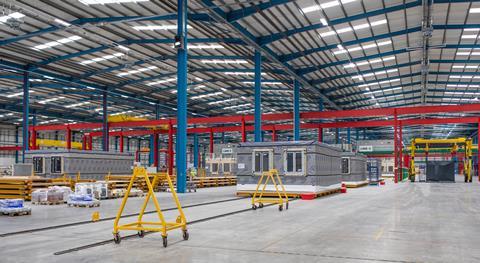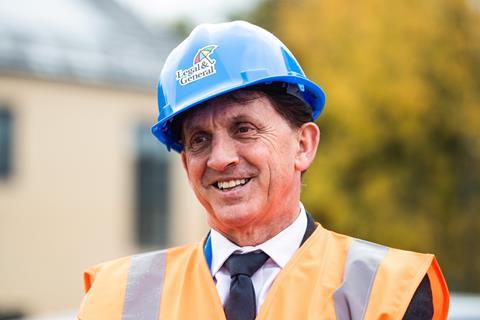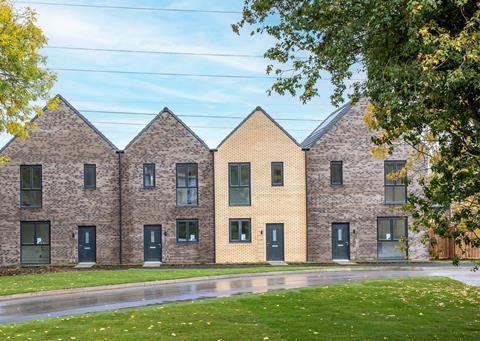Insurance giant to make ’majority’ of its 475 staff redundant after £174m of losses over seven years
Insurance giant L&G is to cease new production at its 475-person timber-frame modular housing factory seven years after setting it up, after racking up at least £174m of losses.
L&G had promised to build 3,500 homes a year from its plant in Sherburn-in-Elmet, near Selby, West Yorkshire, but today said it had “not been able to secure the necessary scale of pipeline” to make the business a success, and was commencing a redundancy consultation with all employees.

A statement from L&G Capital, the L&G subsidiary which owns the business, said it was “proposing to reduce business activity and cease new modular production” at the 550,000 sq ft plant, and was therefore “reviewing and assessing potential strategic options for the business”.
The statement added that the business expected to make the majority of roles redundant at the firm, with a spokesperson later clarifying that 475 staff are employed at the business. The firm will retain staff to honour existing contracts with customers and provide them with aftercare only, the spokesperson said.
The decision to stop production at the business comes months after L&G’s group chief executive Nigel Wilson, who has championed L&G’s investment in housing and modular housing specifically, announced he will be stepping down from the company when a replacement can be found.

The statement said that given the modular factory’s significant fixed cost base, “a strong and predictable site pipeline” was required to make it a sustainable business.
It said: “However, a number of factors, including long planning delays and the impact of recent macro events such as Covid, have meant the business has not been able to secure the necessary scale of pipeline to make the current model work. Without this pipeline, it has not proved possible to build a business that can sustain the significant running costs of the large factory in Selby.
L&G’s move will be seen as a blow to the modular construction industry as a whole, with the insurance giant’s investment seen as a real boost to the credibility of a sector often regarded as a cottage industry. It follows the difficulties at several MMC providers last year, including the collapse of the Urban Splash Sekisui joint venture, problems at Swan’s modular housing programme and the collapse of Caledonian Modular.
>> See also Capital ambitions: Why Nigel Wilson is persisting with L&G’s huge housing push
>> See also Growing pains or cause for concern? What recent financial failures mean for the modular market
>> See also Brave, bold and ambitious: L&G steps up modular housing plans
L&G has previously denied suggestions the business was in difficulty, ever since rumours that the initial equipment installed in the factory after its opening in 2016 had to be replaced. In 2017 the firm hired a former Rolls Royce executive, Rosie Toogood, with significant manufacturing experience, to run the firm, but the business has still struggled to make inroads in the market. In 2021 Toogood said the firm was preparing to ramp up production, and hiring 350 staff in order to do so.
But by late last year it had won a significant pipeline of around 2,200 homes in total, but well short of what would be needed to be delivering 3,500 homes annually from next year.

Recent weeks have also seen reports of build problems on its flagship 185-home Bonnington Walk scheme in Bristol, which had delayed delivery of the scheme.
Last year L&G Modular reported a pre-tax loss of 36.8m for the 2021 calendar year, meaning it had by then racked up a total of £174m in losses since its inception in 2016.
Last year Nigel Wilson told Housing Today that “awful” delays in the planning system had been behind the slow start to the modular business and said he was optimistic for it, but cautioned that it wouldn’t be allowed forever to turn a profit. “Of course we’ve got shareholders as well to think about,” he said.
Bill Hughes, chair of Legal & General Modular Homes’ Board, said today that L&G as a whole remained “deeply committed to the UK housing sector, where we have delivered 15,000 homes over the last three years”, and that the business was “continuing to actively explore all options available to us” regarding the modular firm.
He said the modular business “will retain a select workforce to ensure high quality delivery and aftercare services for our existing customers, whilst engaging with each of our partners regarding ongoing modular projects.”
He said: “Legal & General is proud of what we have achieved in bringing forward a new approach to construction through our factory. However, without the necessary scale of pipeline it is not sustainable to continue producing more modules. We are therefore reluctantly proposing to reduce business activity and cease production of new modules at the factory.
“Regrettably, this includes commencing consultation with all employees around the proposal to make the majority of Modular Homes roles redundant. We recognise this will be a challenging and uncertain period for our staff and we will be actively exploring redeployment opportunities and supporting them during this difficult time.”










No comments yet